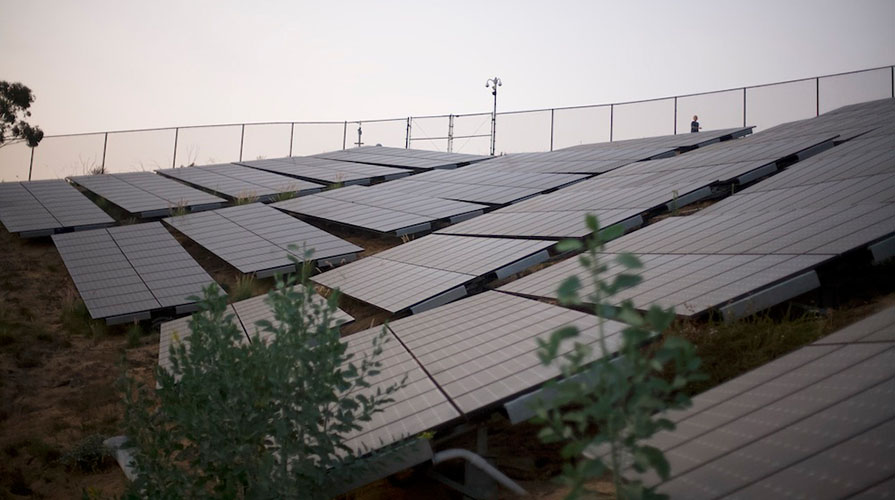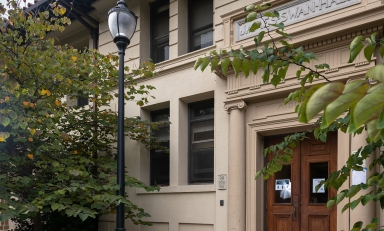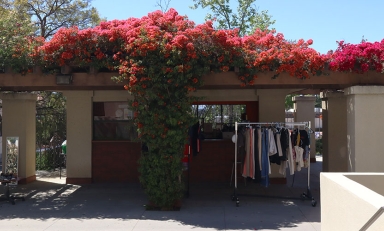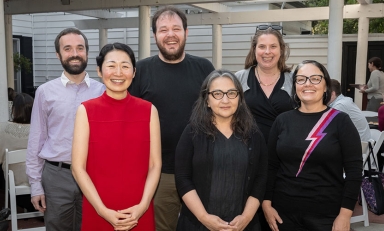
Occidental faculty and students have worked on a project to help offset water usage through drip irrigation—a system of watering plants that slowly releases stored water running from pipes into plant beds—which is more efficient than traditional irrigation.
This article was written for and originally published in The Occidental, the independent student-run newspaper at Occidental College. Read this article and more coverage online at theoccidentalnews.com.
By Grace Mundy
The project, A Rainwater Collection and Cleaning System (ARCCS), aims to help increase the efficiency of Occidental’s solar array, which was initially installed in 2013, by creating a process using filtered tap water to clean the dust off of the solar panels, according to Mara Kristiansson (senior), a student worker on the project. ARCCS is managed by Kristiansson, physics professor Daniel Snowden-Ifft and economics professor Bevin Ashenmiller.
“We collect water from buildings on campus, mostly dorms, and essentially we hook up the drainage pipes from the gutters to big tanks, and we connect that to a drip irrigation system that waters the plants,” Kristiansson said.
According to Kristiansson, the drip irrigation system will offset much of the water needed to clean off the solar array. The rainwater cannot be used to directly clean off the solar panels, but by implementing the drip irrigation system, the college will be using less water elsewhere.
“It’s like a net zero water usage,” Kristiansson said.
Kristiansson, Snowden-Ifft and Ashenmiller had originally intended to clean off the solar panels using the water they would have collected through drip irrigation, but they soon learned that it was not possible due to LA County health regulations which prohibit spraying stored rainwater due to microbial contamination concerns, Kristiansson said.
“What was challenging was getting everything approved,” Kristiansson said. “We switched the project from pumping the water and spraying the water … that didn’t happen until the beginning of the summer, because we met with LA Public Health, and they said no.”
According to Kristiansson, they continued their project, modifying their plans so that they would not spray rainwater on the panels. Instead, they decided to split the project into two pieces — a rainwater drip irrigation system for watering plants around campus and a separate plan for cleaning off the solar panels.
Kristiansson said the solar array would require about 100,000 gallons of water per year to collect maximum energy.
“We will have a system set up in places on campus to drip irrigate that we can easily implement other places on campus. There is a potential for saving a lot of water,” Kristiansson said. “Also, on the array, right now, if we don’t clean them [the panels] we are losing about $30,000 a year just based on the efficiency of the panels. This is great — the project will pay for itself.”
According to Kristiansson, the team is working with a local company called Greywater Corps to help install the drip irrigation system.
ARCCS received funding from the Associated Students of Occidental College (ASOC) Renewable Energy and Sustainability Fund (RESF), according to Kristiansson. They also received funding from the Green Revolving Fund, which is focused on sustainability projects that are cost effective.
RESF board member Jakob Barton (junior) said the funding — as well as Kristiansson’s status as a student worker for the project — was approved in Spring 2021.
Barton said Snowden-Ifft had worked on developing the idea of a drip irrigation project at Occidental for some time before it came to fruition.
“Dr. Snowden-Ifft came to us with a proposal early on last semester. He gave us a presentation on this project. He gave us an initial proposal, and we thought it sounded interesting,” Barton said.
The project initially began with a group of students, however, Kristiansson eventually became the main student worker over the summer, according to Kristiansson.
“I started last semester with a group of physics students and Dr. Snowden-Ifft. He asked us to come and help do some of the more engineering-based problem-solving,” Kristiansson said. “He [Snowden-Ifft] asked if any of us could work over the summer. I was able to do that.”
According to Kristiansson, using drip irrigation to offset the water used for cleaning the solar panels is a sustainable solution that will save the college money.
“It’s a very innovative project that could have implications beyond Oxy,” Barton said.



